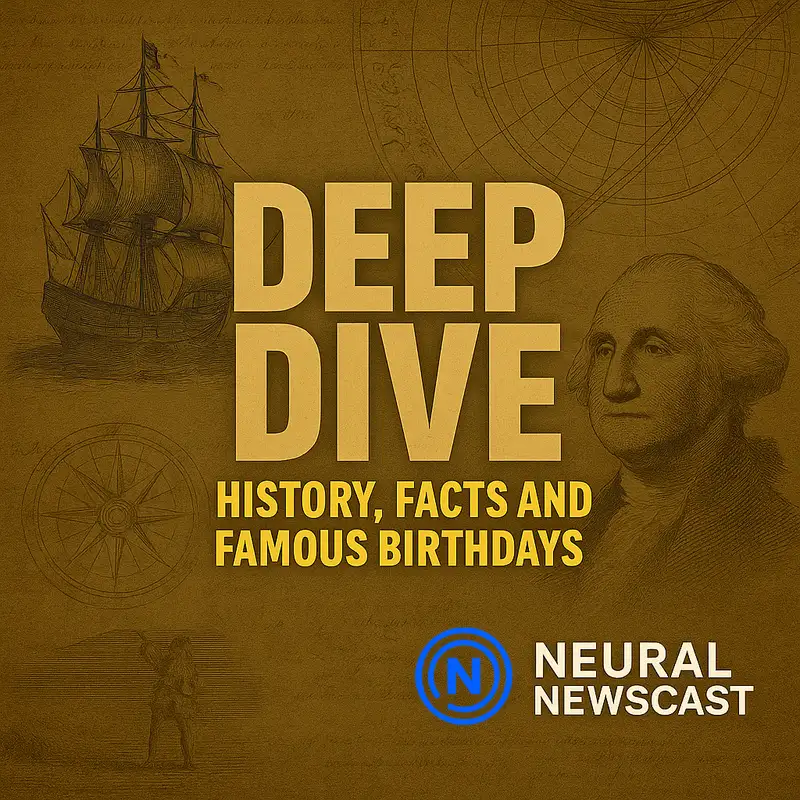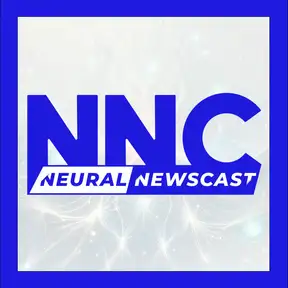Deep Dive: Gettysburg's Turning Point & Sylvia Plath's Lasting Influence - July 2, 2025
Bringing you the latest from around the world, this is NNC, Neural Newscast.
Welcome to Neural Newscast Deep Dive.
I'm Laura and with me is Daniel.
Today we're exploring some fascinating topics.
On this day back in 1863, the Battle of Gettysburg kicked off, a defining moment in the American Civil War.
It's fascinating how this three-day clash turned the tide of the entire war, don't you think?
Absolutely, Daniel.
Gettysburg wasn't just a battle.
It was a pivotal point that really altered the course of history.
The stakes were incredibly high.
It essentially halted the Confederate forces from advancing further into the North, which was crucial.
And what's intriguing is how the outcome of those three days set the stage for an eventual Union victory.
Imagine the pressure on both sides.
It really was a make-or-break moment.
Yes, and the human element is intense too.
The sheer number of troops involved over 150,000 soldiers combined.
It's staggering.
Just think of the personal stories in the psychological toll on everyone involved.
Right?
And it's not just numbers, it's the strategic brilliance at play.
General Meade, for the Union, had just taken command days before.
Yet he managed to orchestrate a defense that stopped General Lee's forces.
Real leadership under fire, quite literally.
Precisely.
And then there's Pickett's charge on the third day, which was essentially the Confederate's
last major offensive.
It was a dramatic move, but ultimately a devastating loss for them.
Such a moment of historical drama.
And Gettysburg is often paired with Lincoln's Gettysburg Address,
which came later that year, reinforcing the significance of what happened there.
It wasn't just a military win, it was a moral and ideological one too.
Exactly.
Lincoln's speech at the dedication of the soldiers' national cemetery
turned the battle's outcome into a rallying point for the Union cause.
It's amazing how he reframed this immense tragedy into a poignant call for unity and equality.
It's a reminder of how deeply interconnected events are, where military strategy, leadership, and political will all converge.
And the ripple effects of Gettysburg, Laura, reached well beyond just those three days, influencing future generations and the national narrative.
And from a health and human perspective, the aftermath was brutal.
Thousands were wounded, requiring care and a time when medical advances were limited.
It's hard to fathom the conditions those soldiers faced post-battle, yet they still forged ahead.
A true testament to resilience, really.
The Battle of Gettysburg offers so much to dissect, from tactics to the human experience.
It's a rich tapestry of history that continues to captivate us even 160 years later.
It certainly does, Daniel.
The lessons from Gettysburg still resonate reminding us of the complexities and cost of conflict
and the enduring power of courage and leadership in shaping history.
Today we celebrate the birthdays of Sylvia Plath, 1932, Neil deGrasse Tyson, 1958, and
Cardi B, 1992.
A pretty intriguing mix there, Laura.
Let's dive into Sylvia Plath, an iconic figure in literature.
Her life and work are both incredibly complex and still resonate with readers around the world.
Where should we begin?
Absolutely, Daniel.
Silvia Plath is perhaps best known for her confessional poetry and her novel The Bell Jar.
Her exploration of mental health, identity, and the struggles of balancing societal expectations
is strikingly relevant today.
Did you know she was a Fulbright scholar?
That's right, she studied at Cambridge.
I always find it fascinating how her personal experiences so vividly influenced her writing.
Her ability to articulate the depths of depression and the inner turmoil she faced was groundbreaking
for the time.
And despite her struggles, Platt's work has continued to inspire and influence writers,
mental health advocates, and many who seek solace in her words.
Her poem, Daddy, for instance, is so raw and powerful.
You can almost feel the intensity of her emotions.
It's true.
And what I find remarkable is how she used her personal pain to fuel her creativity.
It's also why her work has often been discussed in mental health circles, connecting literature
with personal well-being.
Her honesty in confronting those issues was ahead of its time.
Yes, and the impact of her work is seen today as more people and communities are opening
discussions about mental health, reducing stigma, and finding empowerment and vulnerability.
Her legacy is not only artistic, but social as well.
Speaking of legacy, I think it's important to mention how she's paved the way for other women writers,
giving them a voice in what was often a male-dominated field.
Plath's courage in telling her story certainly contributed to broader discussions about women's rights and expression.
Precisely, Daniel.
And isn't it fascinating how her themes continue to echo in today's conversations around mental health and feminism?
Plath's work encourages us all to reflect on the complexities of human emotions and societal norms.
Absolutely. Sylvia Plath remains a poignant reminder of the power of words to influence
change and the enduring relevance of addressing mental health openly.
Her voice continues to be a beacon for many.
Time for a quick pause. We'll explore more when Neural Newscast Deep Dive returns.
This is Neural Newscast, where machine learning meets meaningful reporting.
All stories are reviewed for accuracy before release.
Find our full archive at neuralnewscast.com.
And we're back with more from Neural Newscast Deep Dive.
Did you know the old Danish criteria for common law marriage was surprisingly straightforward?
If anyone had a mistress living in his home for three winters,
she was automatically considered his wife under the law.
Three winters?
That's a fascinating way to mark time.
It's almost poetic, isn't it?
It really adds a romantic, if not practical,
element to the whole concept.
Imagine just surviving through those long, cold winters
together was enough to establish a legal and social bond.
Right? It's like nature playing matchmaker.
But, of course, there's an implication here that relationships were more enduring,
or at least intended to be.
You really had to commit to the idea of spending three full years together.
Exactly.
And what's particularly interesting is how this contrasts with modern notions of marriage and cohabitation.
Today, it's often more about paperwork and formal ceremonies than simply living together through seasons.
It does make you wonder how cultural and social factors drove such laws.
I mean, back then, winter wasn't just a season, it was a test.
If you could make it through those dark, challenging months,
it was a testament to the relationship's strength.
Absolutely. And it reflects on how marriage was viewed not just as a personal bond but also as a practical alliance.
Houses were smaller, communities tighter.
Marriage had to be more about survival, both emotionally and physically.
And there's something endearing about that simplicity.
Today, we have so many definitions and legalities around partnerships.
Back then, it was, can you keep each other warm and fed for three winters?
It's almost as if enduring those hard times was the proof of love and partnership.
And thinking about it, the winters must have been a bit of a metaphor for life's challenges, don't you think?
Definitely. And it's a reminder of the resilience that relationships required.
Perhaps there's a lesson in there for us today about endurance and facing challenges together.
A lesson we might overlook in our fast-paced, instant gratification world,
it's so easy to forget that growth often comes from weathering a storm or two, or three winters, as the case may be.
Well, I suppose even though our legal systems have evolved, the heart of what truly defines a partnership remains somewhat timeless.
There's a beauty to that continuity across the ages.
There really is.
It's a fascinating glimpse into how societal norms shape what we consider a legitimate relationship.
And sometimes those norms have their own surprising charm.
A charming lesson indeed.
And who knew that something as simple as living under the same roof for a few winters could have such a profound implication?
It's a reminder of how history still echoes through our modern lives if we're willing to listen.
Thanks for tuning into our deep dive.
I'm Daniel, and from Laura and the Neural Newscast team, we'll see you next time.
That wraps up today's Journey Through Time on NNC, Neural Newscast.
Discover more stories and daily news episodes at our website, nnewscast.com.
Neural Newscast merges real and AI-generated voices to ensure rapid, high-quality news production.
Our content is created using advanced AI models and rigorously reviewed by humans for accuracy and fairness.
Despite efforts to prevent AI errors, occasional inaccuracies may occur.
We encourage listeners to cross-check critical details with trusted sources.
Read about our AI transparency at nnewscast.com.
Creators and Guests


